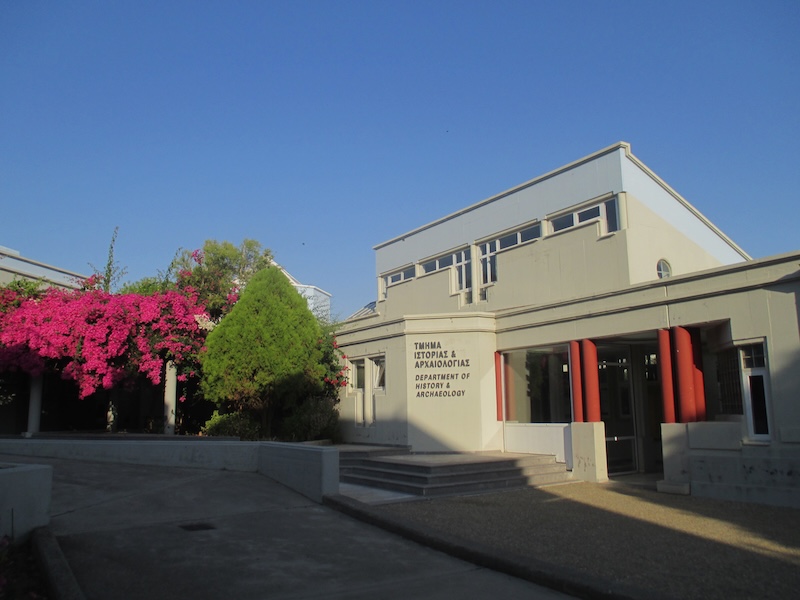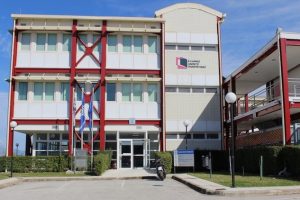
University of Crete Greece
The University of Crete was officially founded under the name University of Crete to create a modern educational institution to serve the region’s needs. The founding came during a period of educational reform in Greece, as the country sought to improve and expand higher education following the fall of the military dictatorship in 1974.
The public university is located in Greece, with campuses on the island of Crete, one of the country’s most historically and culturally rich regions, it is one of the prominent academic institutions in Greece and offers a wide range of undergraduate, graduate, and doctoral programs
In the first years, the university started with limited faculties and departments, emphasizing the social sciences, humanities, and natural sciences. This early academic structure was meant to address both the needs of Greek society and the historical, cultural, and economic context of Crete, The first academic programs were established, and the university began offering undergraduate degrees in subjects like philosophy, history, and the sciences.

Research
The University has developed a strong research profile over the years, especially in areas like biomedicine, physics, and technology. The university attracted leading Greek and international researchers, contributing to the development of cutting-edge academic programs and research projects. Research institutes such as the Institute of Molecular Biology and Biotechnology (IMBB) were created during this period to focus on specialized scientific research.
Research Areas
Some research areas are Natural Sciences which makes
Strong focus on biology, chemistry, and physics.
Notable research in genetics, molecular biology, and environmental science.
Social Sciences and Humanities
Research in sociology, anthropology, history, and philosophy.
Studies often explore cultural dynamics and societal issues.
Engineering and Technology
Research in computer science, telecommunications, and materials science.
Emphasis on innovation and technology transfer.
Health and Medicine
Active research in medical sciences, particularly in clinical and translational research.
Collaboration with hospitals and medical institutions.
Research Centers and Institutes
The university hosts several specialized research centers and institutes that focus on specific fields, promoting interdisciplinary collaboration.
Funding and Grants
Receives funding from various national and European research programs.
Active participation in Horizon Europe and other international funding initiatives.
Publications and Impact
Researchers at the university publish extensively in high-impact journals, contributing to the advancement of knowledge in their fields.
The university’s research has practical implications, influencing policy and contributing to societal challenges.
Collaboration and Networks
Engages in numerous partnerships with other universities, research institutions, and industry, both nationally and internationally.
Encourages student involvement in research projects, fostering a culture of inquiry and innovation.
The University of Crete offers a broad spectrum of academic programs across a variety of disciplines
| Faculties |
|---|
| Faculty of Social Sciences |
| Faculty of Sciences |
| Faculty of Medicine |
| School of Sciences and Technology |
| Faculty of Engineering |
| School of Business and Economics |
Campus and Facilities
The University of Crete has two main campuses, each located in a different city on the island of Crete Rethymno and Heraklion. Both campuses offer a wide range of facilities to support students, faculty, and researchers, providing an ideal environment for academic and personal growth.
Rethymno Campus is Located in the picturesque town of Rethymno, this campus is the heart of the university’s humanities, social sciences, and arts programs. Rethymno itself is a charming city with historical architecture, a vibrant student atmosphere, and proximity to beaches and nature.
Heraklion campus is the largest and most scientifically oriented of the two campuses. Heraklion is the capital of Crete, a bustling city with a rich history and modern infrastructure. The campus is located on the outskirts of the city, close to the city center and the famous Knossos archaeological site.
Student Life
Both campuses are situated in areas of exceptional natural beauty. The Rethymno campus is close to beaches and mountains, while the Heraklion campus offers views of the surrounding countryside. This provides students with a relaxed and inspiring environment for their studies, The university also supports a vibrant student life, offering cultural events, academic seminars, and extracurricular activities. Students can participate in various clubs, societies, and international exchanges, fostering a strong sense of community.
| Courses in English | Bachelor | Masters | PHD |
|---|---|---|---|
| Computer Science | BSC | MSC | PHD |
| Mathematics | BSC | MSC | PHD |
| Biology | BSC | MSC | PHD |
| Clinical and Laboratory Biomedical Sciences | – | MSC | PHD |
| Economics | – | MSC | – |
| Public Health | – | MSC | – |
| Finance | – | MSC | PHD |
| Business Administration | – | MSC | PHD |
| Sociology | – | MSC | PHD |
| Social Policy and Social Work | – | MSC | PHD |
| Environmental Sciences | – | – | PHD |
| History and Archaeology | – | – | PHD |
The admission requirements for the University of Crete (UoC) depend on the level of study (undergraduate, graduate, or doctoral programs) and the specific program applied for.
Undergraduate Admission Requirements
For undergraduate programs, most courses are taught in Greek, but there may be some programs or electives available in English (especially in fields such as business or science).
General Requirements
Secondary Education: Applicants must have completed secondary education (high school) and obtained a secondary school diploma that is recognized in Greece. This includes the Greek equivalent qualification from an international school or another educational system.
Greek Language Proficiency
Since the majority of undergraduate programs are in Greek, applicants must demonstrate proficiency in the Greek language. This can typically be proven through:
A certificate of Greek language proficiency (e.g., Certificate of Proficiency in Greek).
Participation in the Greek University Entrance Exams (for students from Greece or EU/EEA countries) or other recognized exams.
International students who do not speak Greek may be required to take language courses or provide proof of language proficiency in Greek before admission.
Entrance Exams
Some programs may require entrance exams (usually for highly competitive fields like Medicine or Engineering). These exams are typically held in Greek and focus on subjects relevant to the program.
Application Procedure for International Students
Applicants need to submit an online application form through the university’s admissions portal.
Documents Required
A copy of the high school diploma (translated into Greek or English).
Transcript of records.
Proof of Greek language proficiency.
Passport copy (for international students).
Photo and other documents as specified by the specific program.
Application Deadlines Deadlines for undergraduate programs typically follow the academic calendar and may vary. International students are advised to check specific program deadlines for precise information.
Graduate Admission Requirements (Master’s Programs)
The University of Crete offers a wide range of master’s programs in English, especially in biomedical sciences, engineering, business, and social sciences.
Bachelor’s Degree
Applicants must have completed a Bachelor’s degree or equivalent in a relevant field from a recognized institution. The degree should be in a discipline related to the program they wish to apply for (e.g., Computer Science for a Master’s in Computer Science).
Transcripts and GPA Applicants are generally required to submit official transcripts of their academic records, and some programs may have a minimum GPA requirement. A competitive GPA will be helpful, particularly for more selective programs.
English Language Proficiency
Since most graduate programs are offered in English, applicants need to demonstrate proficiency in English. Accepted English language proficiency tests may include:
TOEFL
Minimum score of 80 (internet-based).
IELTS
Minimum score of 6.5 or higher.
Other equivalent tests (e.g., Cambridge English qualifications) may also be accepted.
Recommendation Letters: Most graduate programs require at least two letters of recommendation from academic or professional referees who can speak to the applicant’s qualifications and suitability for the program.
Statement of Purpose
A personal statement or statement of purpose explaining why the applicant wishes to pursue the program, their academic background, and future career goals.
CV/Resume
A current curriculum vitae (CV) or resume detailing academic and professional experience.
Portfolio (for programs in arts, design, etc.)
Interview (either in person or online)
Prerequisite Courses (for some programs, applicants may need to have completed specific undergraduate courses).
Application Procedure for Graduate Programs
Deadlines for each program vary but generally fall in the spring for the fall intake (September) or fall for the spring intake (February).
Doctoral (PhD) Admission Requirements
The University of Crete offers PhD programs in a wide range of fields. These programs are research-focused, and students typically work on specific projects under the supervision of faculty members.
General Requirements
Master’s Degree
Applicants must have completed a Master’s degree (or equivalent) in a relevant field. The Master’s degree should be aligned with the area of research the student intends to pursue.
Research Proposal
A key part of the PhD application process is the submission of a research proposal outlining the proposed research, objectives, methodology, and how it fits within the field of study. This proposal should demonstrate the applicant’s ability to undertake independent research.
Academic Records
Applicants must submit their academic transcripts and show evidence of previous research or academic achievements.
Letters of Recommendation
At least two or three letters of recommendation from academic advisors or professionals familiar with the applicant’s research and academic capabilities.
English Language Proficiency
Since many PhD programs are in English (especially in fields like computer science, biomedical sciences, and engineering), applicants must demonstrate proficiency in English.
Acceptable test scores
TOEFL
Minimum score of 80 (internet-based).
IELTS
Minimum score of 6.5 or higher.
In many cases, PhD candidates will be required to participate in an interview, either in person or online, as part of the selection process.
Tuition Fees and Scholarships
Tuition Fees
For undergraduate programs, Greek students and EU nationals generally do not pay tuition fees, although there might be some administrative fees. Non-EU international students typically have to pay tuition fees, which vary depending on the program.
Graduate Programs
Many graduate programs (Master’s and PhD) require tuition fees, although some programs may offer scholarships or financial aid. Fees vary by program and department, and students should check the specific program’s webpage for details.
Scholarships and Financial Aid:
The University of Crete offers some scholarships, especially for postgraduate students. There may also be opportunities for research assistantships or teaching assistantships in certain programs. External scholarships (e.g., from Greek government programs or EU funding) are also available for international students.
ljslaJLKJDLKajdlkajLKDJLKAjdlkAJLAKAKL
You may also like

Aristotle University of Thessaloniki Greece

University of Thrace Greece

